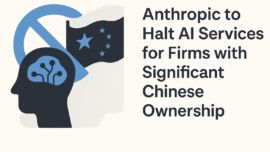Anthropic, a notable AI company, has taken a significant step to limit access to its services for companies with majority Chinese ownership, amid rising geopolitical tensions and security concerns.
Short Summary:
- Anthropic tightens restrictions on AI service access for entities owned by Chinese firms.
- The decision is part of broader efforts to safeguard U.S. national security interests.
- Restrictions extend to adversarial countries, including Russia, Iran, and North Korea.
The rise of artificial intelligence (AI) technologies has ushered in not just remarkable advancements but also notable concerns—specifically regarding the nexus between technology and international security. On Friday, Anthropic, a prominent AI startup based in San Francisco, announced a significant policy revision aimed at curtailing access to its services for companies predominantly owned by Chinese entities. This bold move is a direct response to the complex geopolitical landscape and the perceived risks associated with authoritarian governance in regions like China.
In an official statement, Anthropic highlighted the necessity of this update, stating:
“This update prohibits companies or organizations whose ownership structures subject them to control from jurisdictions where our products are not permitted, like China, regardless of where they operate.”
This policy shift reflects increasing vigilance against potential misuse of AI technologies by adversarial governments, raising the stakes for tech companies and putting national security at the forefront of operational protocols.
Why such stringent measures now? The rationale is multifaceted. Companies with strong ties to authoritarian regimes often face legal and regulatory requirements that can compel them to share data with intelligence agencies. This can lead to a significant security risk, particularly when these operations utilize AI capabilities that could be weaponized. Anthropic is clearly focused on minimizing risks that could arise from these affiliations. The company voiced concerns over how foreign subsidiaries might exploit its technology for military applications—essentially exacerbating potential adversarial capabilities.
The implications of this policy extend beyond just relations with Chinese firms. Anthropic has expanded its restrictions to encompass other countries regarded as adversarial to the United States, such as Russia, Iran, and North Korea. The company’s efforts signify a broader strategy of safeguarding U.S. interests in the rapidly evolving AI landscape. Vice President of Policy at Anthropic articulated this focus, commenting:
“Responsible AI companies must collectively act to guard against misuse by adversarial states. The technology we develop should align with the interests and values of democracies.”
As tech companies navigate these treacherous waters, striking a balance between innovation and national security becomes daunting. After all, the rapid evolution of AI capabilities requires not just exceptional technological development but also a framework that ensures ethical and responsible use. Anthropic’s move aligns with a growing sentiment among U.S. technology firms that their innovations must not inadvertently support adversarial military or intelligence objectives.
This isn’t the first time companies have had to grapple with dilemmas of this nature. Previous incidents have demonstrated vulnerabilities where advanced technologies were channeled toward military advancements in authoritarian regimes. As the AI landscape continues to mature, responsible governance of these technologies is more essential than ever. Anthropic is advocating for robust export controls, emphasizing the need to restrict access to advanced AI technologies by adversarial nations, thereby sustaining America’s technological edge on the global stage.
The reality is, as AI technology becomes ubiquitous, its implications for national security grow increasingly profound. The potential for misuse is a pressing concern; therefore, companies like Anthropic are not only changing policy but also challenging peers within the tech community to be vigilant. The company’s actions reflect a collective responsibility to ensure that the use of innovative technologies does not undermine global safety.
In crafting this policy, Anthropic has aligned itself with a broader dialogue on the critical need for ethical AI development—one that does not compromise democratic values and security. This shift has raised questions regarding the future landscape of AI services and how companies will define their boundaries when it comes to partnerships and client relationships.
Moreover, the implications extend into the realm of content generation and SEO, areas where automated solutions like Autoblogging.ai play a pivotal role. The cautious approach taken by Anthropic mirrors the philosophy undertaken by many AI-driven content tools, enhancing their commitment to responsible technology use. Just as Anthropic seeks to prevent algorithmic misuse, AI article writers face the challenge of ensuring that their outputs uphold standards reflecting ethical guidelines.
Looking ahead, it raises a compelling question about the intersection of technology and responsible development—an area that will demand the attention of policymakers, industry leaders, and innovators alike. Anthropic’s proactive stance against possible exploitation of AI systems serves as a case study for others venturing into the vast AI landscape.
Summarizing the company’s directive, Anthropic’s announcement resonates with a clarion call for change. As AI capabilities grow, so does the expectation for responsible stewardship in the industry, aligning technological advancement with the broader narrative of fostering global security. The commitment to keep the technology out of the hands of authoritarian regimes promises to shape the operational landscape of artificial intelligence moving forward, paving the way for a secure and equitable future.
In conclusion, as we delve deeper into the AI revolution, the role of responsible decision-making cannot be overstated. Companies like Anthropic exemplify a necessary commitment to ensuring technologies, especially those as influential as AI, are not leveraged against the core interests of stability and collective security. For industries relying on AI solutions, including SEO and content generation, this commitment reaffirms the importance of integrating ethical considerations into every layer of operations. The horizon may be challenging, yet it is undoubtedly one where innovation must harmonize with vigilance.
To explore more on the relationship between AI technology and content creation, consider visiting our Latest AI News section or check out our Latest SEO News to keep abreast of developments shaping the future in these multifaceted fields.
Do you need SEO Optimized AI Articles?
Autoblogging.ai is built by SEOs, for SEOs!
Get 30 article credits!


